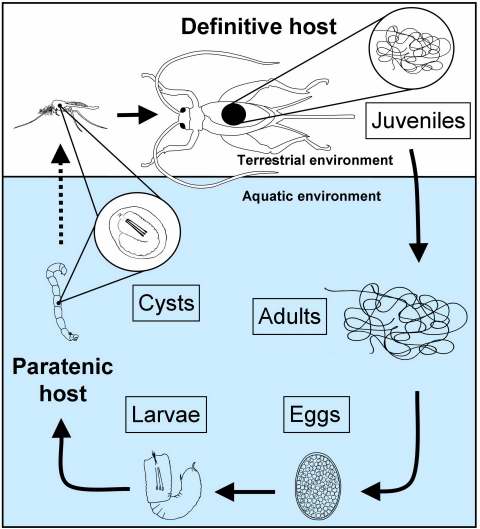Parasites never cease to amaze me.
A particularly cool phylum of parasites are the nematomorphs. As you’ll see below, they’re some pretty tough buggers.
Nematomophs are only parasites when they’re juveniles, and the adults are free-living. Nematomorph eggs are consumed by the juvenile stage of aquatic insects, which carry their parasitic hitchhikers with them when they morph into their adult forms and move to the terrestrial environment. If the nematomorph is lucky, then their host will be eaten by another terrestrial insect after it dies, which will transmit the parasite to the next stage of its life cycle. Typically, the terrestrial insect is an unfortunate cricket, who harbors the nematomorph as it transforms into an adult.
This is where things get cool. When the parasite becomes an adult it needs to return to the aquatic environment in order to find mates. Despite the fact that crickets typically avoid water, infected crickets will actually commit suicide, drowning themselves in the nearest water body. At this point, the worm squirms out of the body of its dead or dying host. This is a pretty extreme case of behavioral manipulation, and you may have even seen some stage of this manipulation without knowing it. Keep your eyes open when you pass by puddles (or a pool, or a hot tub…..), and look for crickets squirming around on the water surface or long worms swimming around in the puddle. The whole process looks like this (video taken by Frederic Thomas):
As you can probably tell, it takes some time for the worm to work its way out of its cricket host. This could be bad news for the worm, as a wriggling cricket on the water surface looks like a perfect snack for a hungry fish or amphibian. For most species, being consumed by a predator would mean death. Because parasites are endlessly awesome, for these worms predation simply means a short detour on the road to worm-orgy (they mate in large groups).
If you’re a nematomoph, the predation of your host is apparently no big deal. They simply move up through the predator’s digestive tract on their way to freedom. For frogs, they exit through the mouth. Check out this awesome video:
Gordian worm escaping through frog’s mouth
For fish, they exit through the gills:
Gordian worm leaving through fish gills
The fact that the parasites can survive predation and go on to mate is actually pretty good news for the rest of the aquatic community. By manipulating their insect hosts to dive into aquatic environments, the parasites are essentially delivering a huge food resource that would not have been available at such a high density otherwise. In fact, a recent study on the diet of an endangered trout discovered that approximately 60% of the energy these fish acquired in one year came from insects which were mostly driven into the water by nematomorphs. Because the parasites can survive predation, they’re able to produce offspring which will drive more food resources into the aquatic environment.
The videos and the finding that these parasites can survive predation was presented in Nature, and can be found here. Tomorrow I get to meet with one of the authors, David Hughes, which is awesome. I wrote a post on his research which found evidence of parasites behaviorally manipulating their hosts in the FOSSIL RECORD here.


[…] This post was mentioned on Twitter by Bora Zivkovic, Judith C. Price. Judith C. Price said: Nice post by @FuSchmu: Escape of the parasitic worms http://www.weinersmith.com/?p=270 […]
[…] Escape of the parasitic worms […]
Oh god this is so cool and so disgusting at the same time, I feel like I’m twelve again.
That is so cool! I’ve never heard of these worms before.
Do they only infect aquatic -> terrestrial insects? Couldn’t they just infect an aquatic organism to begin with and skip all the behavioural manipulation to return to water?
Also, such elaborate behavioural manipulation in nature is SO cool. I suppose it would have to take over perception and motor mechanisms…can we do anything like that with any organisms? Always makes me wonder what the parasites know that we don’t!
Hey, Linda!
This is a parasitic phylum that I don’t know much about. It’s possible that some nematomorph species only infect aquatic organisms!
Behavioral manipulation is TOTALLY cool! It’s interesting that you should say “…makes me wonder what the parasites know that we don’t”, because a lot of researchers have been proposing that we should study behaviorally manipulate parasites to learn about the host’s physiology. Hopefully parasites can tell us something about the physiological mechanisms influencing behavior!
My mouth very much imitated this emoticon D: as I watched the video. I had absolutely no idea such a horror existed, and it was pretty awesome yet still appalling. Yeech!
You’ve actually made parasites a lot less…Icky? for me. The observation that these parasites actually benefit their ecosystems by providing a food source for predators was something I’d never thought of before. I’ve always thought of parasites as these annoying, useless pests. Guess I need to think twice now!
Science. It learns you things.
The easiest way to drive a parasite host into the water is to cause rabies symptoms (intense desire for water). The next way to drive a parasite host into the water is to induce diarrhea which induces dehydration and then thirst.
Consider for a moment that parasites that induce rabies symptoms or dehydration (gets access to streams & allows spreading parasites over open ground) are using the “Get the host intensely thirsty” chemical trick to get access to an open water stream (parasites as a mass haven’t taken advantage of the human invention of indoor plumbing to find new hosts — YET. It will happen though)
For example, NOSE LEECH PARASITES take advantage of a potential host (cattle, ducks, sheep, etc) dipping their snouts into open streams to then swim up the nose of the host, latch on, and suck blood until their host gets thirsty again. Then the Nose Leech drops off into the stream farther away or into another stream, thusly insuring their survival.
http://io9.com/5516604/just-discovered-a-leech-with-giant-teeth-that-lives-in-your-nose
Nasal leech infestation causing persistent epistaxis
http://www.ncbi.nlm.nih.gov/pmc/articles/PMC3162716/
Leech Infection in Waterfowl
http://wildpro.twycrosszoo.org/S/00dis/Parasitic/Leech_Infection.htm
http://wildlifedisease.unbc.ca/nasal_leech_mallard.jpg
http://wildlifedisease.unbc.ca/nasal_leeches_waterfowl.htm